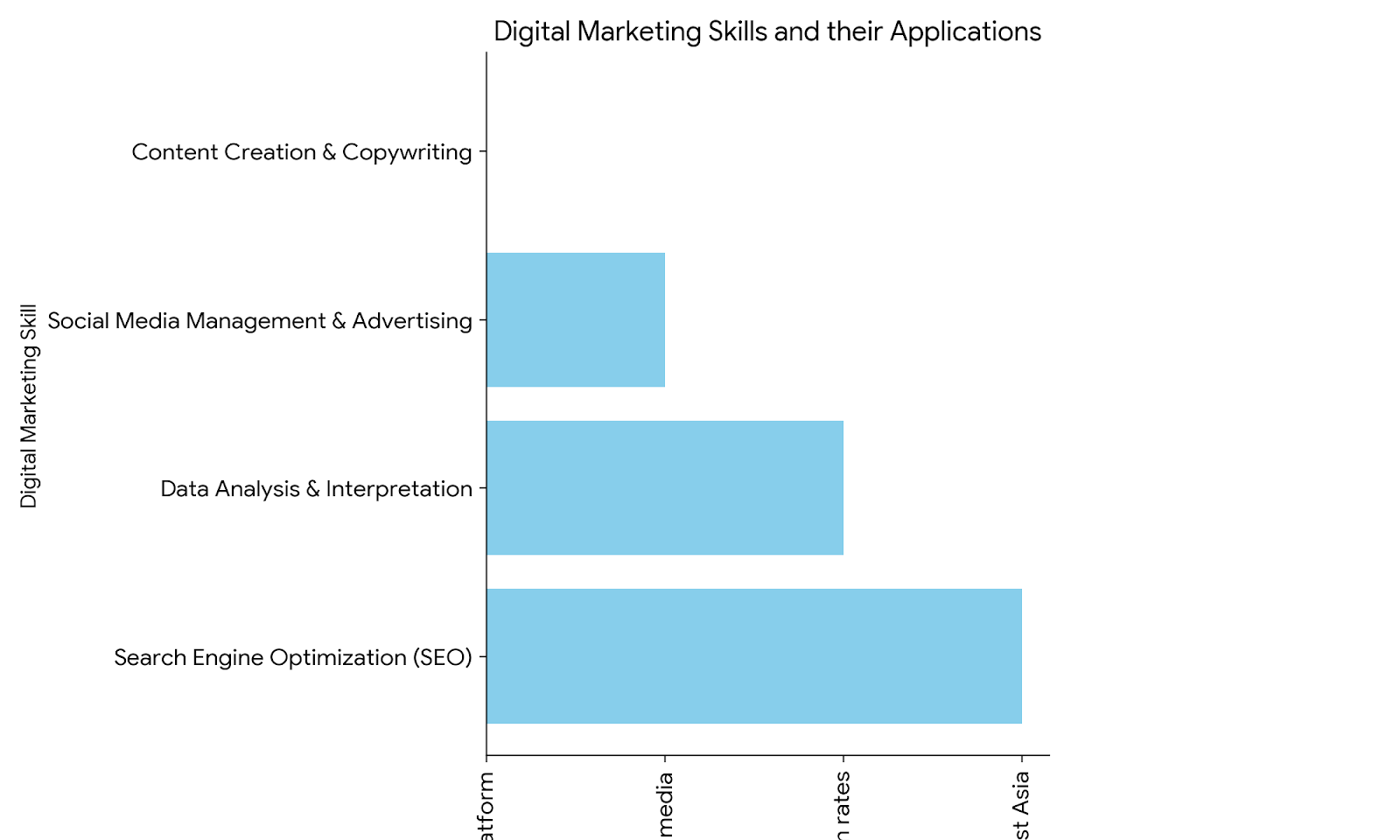The digital marketing landscape is constantly shifting. As we approach 2025, staying ahead in this fast-paced world is crucial for professionals and businesses alike. The once cutting-edge skills may soon become outdated. To thrive, you need to be proactive about your learning and adapt to the latest trends.
Digital marketing skills are not just valuable; they are essential. With new technologies emerging every day, the demand for diverse skill sets continues to grow. From content creation to data analysis, there’s a vast array of areas to consider honing. Whether you’re a seasoned marketer or just starting, understanding what skills will dominate in 2025 can set you apart from the competition.
Let’s explore which digital marketing skills will be vital in shaping successful campaigns and driving growth over the next few years.
The importance of keeping up with digital marketing trends
The digital marketing world evolves at breakneck speed. What worked yesterday may not yield results today. Keeping up with trends is essential for relevance and success.
Consumers are more informed than ever. They expect personalized experiences tailored to their needs. Marketers who stay updated can deliver this effectively, capturing attention in a crowded marketplace.
Emerging technologies also shape marketing strategies. From AI tools to new social media platforms, understanding these innovations can provide a competitive edge.
Moreover, industry regulations frequently change. Staying abreast of legal considerations ensures compliance and protects your brand’s reputation.
Adapting to trends fosters creativity and innovation within teams. It encourages fresh ideas that resonate with audiences while improving overall strategy effectiveness.
In an age where agility matters, staying current with digital marketing trends isn’t just beneficial; it’s vital for sustained growth and engagement.
Digital marketing is not static; it’s a dynamic ecosystem. Trends shift rapidly, influenced by consumer behavior and technological advancements. Marketers who keep pace with these changes can capitalize on new opportunities.
Being aware of the latest trends helps professionals understand their audience better. Insights gleaned from current data can drive more effective campaigns, tailored to what consumers want right now.
Moreover, adapting to digital marketing trends fosters innovation. It encourages marketers to experiment with fresh ideas and strategies that resonate in today’s marketplace.
Staying updated also enhances credibility within the industry. Clients and employers value those who demonstrate knowledge of cutting-edge practices and tools.
Embracing change sparks growth—both personally and professionally. As you evolve alongside your field, you position yourself as a leader in an ever-changing environment.
What Digital Marketing skills will be in demand in 2025?
As we look ahead to 2025, several digital marketing skills are poised to take center stage. The rapid evolution of technology means marketers must adapt quickly.
First on the list is content creation. Brands need compelling narratives that resonate with their audience across various platforms. Video content and interactive storytelling will dominate.
Next up, social media management remains crucial. Understanding algorithm changes and audience engagement metrics will be vital for success in this realm.
Data analysis stands out as well. Companies increasingly rely on data-driven strategies to inform decisions. Professionals skilled in interpreting complex datasets will be highly sought after.
Search engine optimization (SEO) continues its significance. With ever-changing algorithms, mastering SEO techniques ensures visibility and relevance amidst competition.
These skills represent just a glimpse into what’s essential for thriving in the dynamic landscape of digital marketing by 2025.
As we look ahead to 2025, several digital marketing skills are likely to shape the industry landscape. First and foremost, data analytics will remain crucial. The ability to interpret complex datasets helps marketers understand consumer behavior and optimize their strategies accordingly.
Another skill gaining traction is artificial intelligence (AI) integration in marketing. Understanding how AI tools can enhance customer experience through personalization will be invaluable. Marketers who can effectively leverage machine learning algorithms for targeted campaigns will stand out.
Moreover, content creation continues to evolve. Video marketing has surged in popularity, so being adept at creating engaging video content can give professionals a competitive edge. Additionally, expertise in voice search optimization is becoming essential as more consumers utilize smart speakers and virtual assistants.
Social media management also requires an evolving skill set due to the rapid changes on platforms like TikTok and Instagram. Staying current with trends and understanding audience engagement techniques are vital for success.
Knowledge of privacy regulations such as GDPR will be increasingly necessary as data protection becomes a priority across industries. Marketers need to balance effective targeting while respecting user privacy concerns.
These digital marketing skills not only prepare you for future challenges but position you well within this dynamic field as it continues to grow and change rapidly.
Content creation and copywriting
Content creation and copywriting are at the heart of digital marketing. They shape how brands communicate with their audiences. As we move toward 2025, these skills will only gain importance.
Crafting compelling content demands creativity and strategy. Marketers need to understand their audience deeply. Knowing what resonates with them can drive engagement and conversion rates.
Copywriting is more than just writing persuasive text. It’s about telling a story that connects emotionally with readers. Strong narratives can build brand loyalty over time.
Visual storytelling also plays a crucial role in this space. Integrating images, videos, and infographics enhances user experience significantly. A well-rounded skill set in both written and visual content will be essential for future marketers.
The landscape keeps evolving, making continuous learning vital for success in this area. Embracing new tools and trends will help you stay ahead of the curve.
Content creation and copywriting are two of the most essential digital marketing skills to master in 2025. As consumers become more discerning, brands need to produce high-quality content that resonates deeply with their audience. This means understanding not just what to say but how to say it effectively.
Visual storytelling will take center stage, making it crucial for marketers to be adept at creating engaging videos and graphics. The rise of platforms like TikTok and Instagram Reels demonstrates this shift toward short-form visual content. Marketers who can craft compelling narratives through these mediums will have a significant advantage.
Moreover, writing skills remain vital as well. Copywriting isn’t just about selling; it’s about connecting emotionally with your audience. Brands that use authentic voices and relatable messaging will stand out in an overcrowded marketplace.
SEO also plays a critical role here. Understanding keywords, and user intent, and optimizing content for search engines is necessary for reaching wider audiences online.
As algorithms evolve, so too must our approach to content creation. Keeping up with trends ensures your strategies remain relevant—whether that’s integrating AI tools or leveraging data analytics for better insights into consumer behavior.
By honing these skills now, you’ll position yourself as a valuable asset within any digital marketing team come 2025. Embrace the changes on the horizon; adapting early will set you apart from those who lag in this fast-paced industry.
Social media management and advertising
Social media management and advertising are crucial components of digital marketing skills that will remain in high demand. Platforms like Facebook, Instagram, TikTok, and LinkedIn continue to evolve. Staying updated on their features is essential for marketers.
Creating engaging content tailored to each platform boosts visibility and engagement rates. Understanding the nuances of audience behavior can enhance your effectiveness in reaching target demographics.
Paid social media advertising is also a key area to master. Familiarity with ad formats and targeting options enables you to optimize campaigns effectively. Knowing how algorithms work can significantly improve performance metrics.
Community engagement matters too. Building relationships with followers fosters loyalty and encourages organic growth. Listening to feedback helps refine strategies over time, making it easier to adapt as trends shift.
Investing time in mastering these skills ensures you’re equipped for the future landscape of digital marketing.
Social media platforms continue to evolve, making social media management and advertising crucial skills for digital marketers in 2025. With billions of users worldwide, these platforms serve as powerful tools for brands to engage with their audience.
Understanding how to create compelling content tailored for different platforms will be key. Each platform has its unique culture and user behavior. For example, TikTok thrives on short, entertaining videos while LinkedIn’s audience prefers professional insights and articles.
Additionally, mastering paid social advertising will set you apart from the competition. The ability to analyze data effectively can improve ad performance significantly. Knowing when and where to invest your budget can lead to higher conversion rates.
As algorithms change frequently, staying updated on trends is essential. This means not only keeping an eye on emerging tools but also understanding shifts in consumer preferences and behaviors.
Building a community around your brand through engagement strategies like interactive posts or live sessions is becoming increasingly important too. Users want authentic interactions rather than just sales pitches.
These aspects all point toward one certainty: honing your social media skills will empower you as a digital marketer well into the future.
Data analysis and interpretation
Data analysis and interpretation is becoming a cornerstone of effective digital marketing. As businesses generate vast amounts of data, the ability to sift through it becomes crucial.
Marketers will need to develop skills in using analytics tools. Understanding metrics like conversion rates, click-through rates, and customer behavior patterns can guide strategic decisions.
Interpreting data isn’t just about looking at numbers; it’s about storytelling. Marketers who can translate raw data into actionable insights will stand out. They’ll be able to craft campaigns that resonate with target audiences based on solid evidence rather than guesswork.
Moreover, predictive analytics will play a significant role as marketers seek to foresee trends and consumer preferences. This proactive approach enables brands to stay ahead in an ever-competitive landscape.
The demand for professionals skilled in interpreting complex datasets continues to rise as organizations aim for more personalized engagement strategies.
As digital marketing evolves, the ability to analyze and interpret data is becoming increasingly crucial. In 2025, businesses will rely more heavily on data-driven strategies to make informed decisions. This trend emphasizes the importance of understanding key performance indicators (KPIs) and utilizing analytics tools effectively.
Marketers will need to extract insights from vast amounts of data generated across various platforms. Skills in interpreting this information can lead to better-targeted campaigns, improved customer experiences, and enhanced ROI. Familiarity with tools like Google Analytics, social media insights dashboards, and CRM systems will be essential for anyone looking to advance in their digital marketing career.
Being able to synthesize complex data into actionable recommendations will set you apart from your peers. Employers are searching for professionals who not only collect data but also translate it into meaningful narratives that drive strategy forward.
The future of digital marketing relies on a blend of creativity and analytical prowess. As we head toward 2025, honing these skills could open doors to new opportunities in an ever-changing landscape where adaptability is key.
Search engine optimization (SEO)
Search engine optimization (SEO) remains a cornerstone of digital marketing skills in 2025. As search engines evolve, so do the tactics to improve visibility online.
Understanding keyword research is essential. It helps identify what your audience is searching for and how to tailor content accordingly.
Technical SEO will also gain importance. Optimizing site speed and mobile responsiveness can significantly impact user experience and rankings.
On-page SEO techniques are crucial too. Crafting compelling meta descriptions and utilizing header tags strategically can enhance click-through rates.
Moreover, staying updated on algorithm changes from major search engines is vital. Adapting strategies based on these updates ensures sustained success in organic traffic generation.
As the competition for prime real estate on search engine results pages (SERPs) intensifies, SEO will remain critical in driving organic traffic and staying ahead of competitors.
Search engine optimization (SEO) remains a cornerstone of digital marketing skills in 2025. As search engines evolve, so do the strategies to rank higher on their results pages. Understanding how SEO works will be crucial for any marketer.
Marketers need to stay updated with algorithm changes and trends that affect search visibility. From keyword research to on-page optimization, every aspect of SEO requires attention and skill. Additionally, voice search and mobile-first indexing are gaining traction, making it essential to adapt your strategies accordingly.
Technical SEO is also becoming more important as websites grow increasingly complex. Knowledge about site speed, mobile usability, and structured data can set you apart from competitors who may overlook these elements.
Investing time in mastering SEO not only boosts website traffic but enhances brand credibility too. Companies aim for organic reach rather than relying solely on paid advertising. Therefore, honing this skill will keep you relevant in an ever-changing digital landscape.
For those looking ahead to 2025, embracing these key digital marketing skills will help them navigate the future effectively. Adopting new technologies and methodologies will ensure marketers remain at the forefront of industry practices while driving real results for their businesses.

Conclusion: The ever-evolving world of digital marketing
The digital marketing landscape is always changing. Keeping up with these shifts is crucial for anyone looking to thrive in this field. As we approach 2025, the demand for specific skills will only grow stronger.
Content creation and copywriting are at the heart of effective marketing strategies. Brands need compelling narratives that resonate with their audience. This skill isn’t just about writing; it’s about storytelling and understanding consumer psychology.
Social media management and advertising evolve rapidly as platforms introduce new features and algorithms. Marketers must adapt quickly, learning to engage users effectively while maximizing budget efficiency.
Data analysis has become a cornerstone of successful campaigns. The ability to interpret data allows marketers to make informed decisions, optimize tactics, and drive better results through targeted efforts.
Search engine optimization remains vital too. With search engines constantly updating their algorithms, mastering SEO techniques ensures visibility in an increasingly crowded online space.
As technology advances and consumer behavior shifts, those who harness these digital marketing skills will stand out from the competition. Embracing continuous learning isn’t just beneficial; it’s essential for success in this dynamic arena where innovation reigns supreme.



